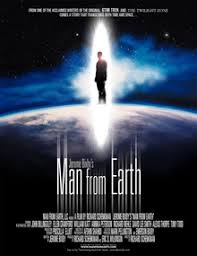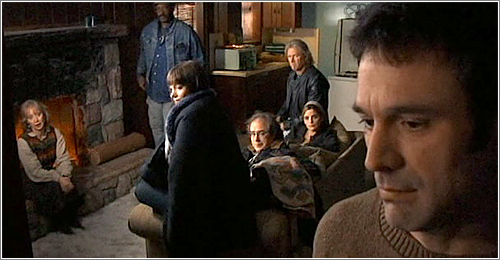IMDb meta-data is runtime of 1 hour and 27 minutes, under-rated 7.9 by 153342 cinemitiziens
Genre: Sy Fy.
Verdict: Unique.

Dr John is leaving town, having resigned from the local college where he taught for several years. He will pack up and leave without fuss or fanfare, but…..
Friends arrive bearing beer for a surprise send-off party. They gather: a biologist, an anthropologist, a geologist, an historian, a theologian are among their number. Some are solo, and others have paramours with their own academic fields. They sit around, joking, talking about sports when one notes that it is Columbus Day. (That used to be a national holiday in honour of Christopher Columbus blundering into the West Indies.)
Warning SPOILER. To read on is to find all.
At which point John says, ‘I had a chance to sail with him’…and goes on to describe Columbus, the ships, and crew and his fear of a flat earth which precluded going along. The others sit in silence, surprised, bemused, anticipating a punch line, stunned, but John, though low in key, is serious, sustained, and systematic.

His mien is shy, diffident, reluctant even. Yet he goes on.
He says he is a very old man, despite his appearance of a thirty-five year old. In fact, he estimates his age at 14,000 years. That is right 1 4 0 0 0 years. [Think of all those IRS returns.] Estimates, because there is no 14,000 year old birth certificate.
When he first noticed others ageing and dying, he began to realise slowly that he was different. He learned that in small tribal societies being different was dangerous and moved on, and on. He has since travelled the world slowly and learned to move on before others noticed that he does not age. He has been injured. He has been ill, but he has always recovered.
He has no superhuman powers. No special insight. He is just one individual and he only grasped the significance of many things later when he read about them, e.g., Columbus. At the time, Colon was just another Genoaese adventurer going West instead of East. When Genoaese sailed East they were pirates preying on Venice and Constantinople. When they went West they were explorers.
The assembled scholars do what scholars do best — ‘Make snide remarks and quibble,’ chorused the fraternity brothers — no, ah, yes, well they do that, but they also ask questions, many of them, and he has answers. All simple. He has lived a long time and learned a lot but he has forgotten most of it over time. He has no superhuman mental powers. He can be hurt. If shot, as one proposes, he will die. It was a scary thought that the dean carried a gun. The fraternity brothers have pledged themselves to be more respectful.
Has he met others like himself? Maybe, he says. Not sure. Not the sort of thing to talk about with strangers in an elevator, and as he is always moving on, he is usually with strangers. Of course the premise of the story is that he has chosen to tell these people who have surprised him with this gathering.
Does he have proof? No more than any one of them. A Driver’s License. Not a stone age name tag or SSN 000000000001.
Isn’t he weary and bored? Well, yes, but that is why has earned so many degrees over the centuries and moving on is always a stimulating challenge.
He has mundane but credible answers to the questions they throw at him. The night wears on. The beer flow is exhausted and the whiskey bottle ebbs. The nods begin.
Finally, in anger one guest tells him to stop teasing them with this hokum. And he does. He says it was all a lie, all a joke that got out of hand. Everyone laughs in relief, especially the theologian for whom an immortal is a god. The party members leave. All but two.
One of the two remaining asks him, ‘Why did you lie?’
Which lie? Clearly the interrogator believed the super Methuselah story and means the lie that it was all a joke. The truth is that he is 14,000 years old. [Image his pension payout.]
Now I would have left it there. But the screen play has other elements which are well played but which cut across the intellectual plane of the story. One is about the historical Jesus and two others are about emotional relations to these last two characters. Well played though they be, they are superfluous. And the emotional connections defuse that last ambiguous remark about which was the lie.
The screenplay by Jerome Bixby is a corker, but he did not live to see this pet project to completion, having written the first draft in the 1960s. His other credits include ‘Fantastic Voyage’ (1966), and many episodes of ‘Star Trek,’ ‘Twilight Zone,’ and ‘Men into Space.’ His Sy Fy CV is rich. The direction of Richard Schenkman is invisible. That is high praise for what is a one set, stagnant play. He injects just enough movement and establishing shots to retain visual interest and to remind viewers that nature is indifferent.
It is sometimes performed as a stage play. All it takes is a few chairs and some players.
The screenplay passes lightly over love and sex, though not entirely, but it does completely elide language. Has this travelling man from India to Indianapolis learned all the languages in-between. Does he retain the Latin Columbus spoke? Urdu? Aramaic? Greek? Gypo? Arabic? Hindi?
David Lee Smith carries the picture as ‘The Man from Earth’ with a subdued intensity, though what the title means remains a mystery to this viewer. The ensemble cast includes the marvellous Dr Phlox from ‘Star Trek: Enterprise’ and William Katt, who was memorable in ‘Big Wednesday’ (1978), made a return to my consciousness here with his soul patch.
Skip to content
